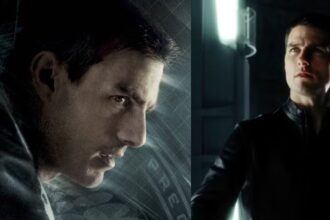
Vanilla Sky is a film that thrives on blurred lines. At its surface, it begins as a romantic drama about David Aames, a wealthy publishing magnate with a life many would envy: money, charm, success, and the attention of women.
Beneath this glossy exterior lurks a restless hollowness, a man struggling with authenticity and unable to face the consequences of carelessness in relationships and responsibility. His world fractures after a tragedy, but the deeper the story goes, the harder it is to separate dreams from reality.
The ending of Vanilla Sky is famous for its complexity, leaving audiences debating what was real, what was imagined, and what it says about life, love, and death. To fully appreciate the final act, it helps to trace how the narrative leads David towards his climactic choice.
David first lives a life of luxury and recklessness, dating Julie Gianni casually while also becoming intrigued by Sofia, a woman he sees as symbolic of hope and truth.
That fragile balance shatters when Julie, feeling rejected, drives them off a bridge in a jealous rage. David survives but is left disfigured. This disfigurement not only scars him outwardly but also mirrors his troubled psyche. His sense of reality begins to fragment more drastically after this point.
Also Read: Shrek Forever After Ending Explained: Love Restores True Reality
The Layers of Reality and Illusion
The final section of the movie reveals that the fractured events we witness are not purely a linear reality but an intertwining of memories, hallucinations, and a technological dream state. After his accident, David struggles with his deformity, feelings of rejection, and his longing for Sofia.
The pieces don’t quite fit together logically: relationships shift tone abruptly, characters act strangely, and the story is punctuated by surreal moments. All of this is intentional because, eventually, we learn David has been living in something called a “Lucid Dream,” created by the company Life Extension.
Life Extension offers cryonic preservation for the wealthy, promising them a form of continued existence until science can revive them. As an option, they also allow customers to live in artificial dream realities where desire and memory can blend seamlessly.
After falling into despair, David chooses this option without fully understanding its implication. Everything he experiences after this choice his reconnection with Sofia, surreal distortions of events, the murderous jealousy, even his therapy sessions, are products of his mind trying to cope with the contract he entered.
Told through fragmented flashbacks and sessions with McCabe, the psychiatrist, the “truth” begins to emerge: David has been asleep for 150 years.
The horrifying inconsistencies in his perception are due to subconscious glitches, what the film calls technical support issues with his program. What seemed like reality collapses into an acknowledgment of a manufactured existence.
The Ending Choice: Fear or Freedom
The ending reaches its peak when David confronts the truth on the rooftop with the Life Extension representative, Tech Support. Here, the choice becomes literal: remain within the dream, comfortable and safe, but forever artificial, or leap from the rooftop, effectively “waking up” to real life in the future.
This decision is symbolic: stay attached to illusions of comfort and fantasy, or embrace pain, authenticity, and whatever lies beyond.
Sofia represents what David has longed for but perhaps never truly had: a pure connection. Yet her presence is a creation of his dreaming mind, a symbol of his unreachable ideal rather than a real partner.
The rooftop discussion underscores this key revelation. If David truly desires real life, he must let go of Sofia, the dream, and the comfort that Life Extension is offering. By leaping from the rooftop, he accepts uncertainty, mortality, and pain.
As he decides to jump, the film allows a voiceover of Sofia encouraging him not to be afraid. It blurs tender affection with symbolic self-realization. Her voice could belong to Sofia, but more importantly, it resonates as David’s own conscience pushing him toward courage.
He closes his eyes, makes peace with memory, and falls. The final seconds show his eyes opening, accompanied by the simple word “Open your eyes,” suggesting that David has awakened into the future, thawed from his frozen state, and now truly free to redefine his life.
Symbolism and Interpretation
The ending can be read in several ways. Some interpret the rooftop leap as a redemptive act, accepting the consequences of his past selfishness and moving beyond them. Others see it more as a metaphor for breaking out of denial and facing the unpredictable truths of life.

The presence of Sofia as a constant figure demonstrates David’s yearning for redemption through love, which he mistakes for salvation at times. But the rooftop conversation reveals that true meaning does not come from clinging to someone idealized but from confronting reality head-on, however painful.
The film’s last moments are both hopeful and unsettling. Hopeful, because David chooses the truth. Unsettling, because the audience does not know what the future holds once he wakes.
Did science truly advance enough to heal him? Will anyone he once loved still exist 150 years later? The ambiguity forces the viewer to wrestle with the same questions. David faced the question of what is worth more: a comfortable illusion or a difficult reality?
Why the Ending Resonates
The ending of Vanilla Sky sticks with audiences because it turns what seemed like a love story into a journey about self-awareness, accountability, and the cost of escape. Beneath the film’s dreamy aesthetics is a sharp meditation on what it means to confront truth.
For David, a man who lived superficially and glided through privilege, the Lucid Dream becomes a prison disguised as paradise. His leap from the rooftop is an act of maturity and bravery, an embrace of imperfection and uncertainty over the false perfection of fantasy.
That final open-eye moment signifies the ultimate act of waking up in both literal and metaphorical terms choosing life with all its difficulties rather than being trapped by comfort that isn’t real.
Also Read: Elemental Ending Explained: Love Defies Boundaries of Fire and Water








